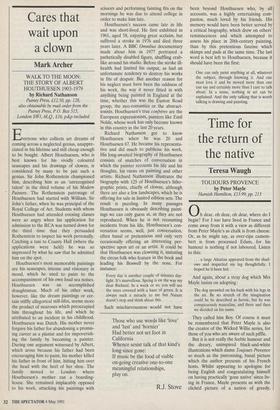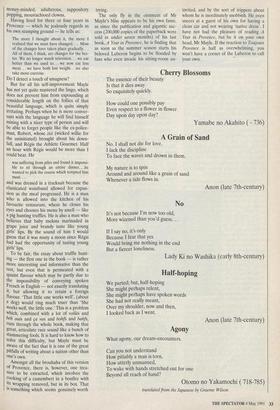Time for the return of the native
Teresa Waugh
TOUJOURS PROVENCE by Peter Mayle Hamish Hamilton, £13.99, pp. 213 0 h dear, oh dear, oh dear, where do I begin? For I too have lived in France and come away from it with a view as different from Peter Mayle's as chalk is from cheese. Or, as he might say, as over-ripe camem- bert is from processed Edam, for his humour is nothing if not laboured. Listen to this: ... a large Alsatian appeared from the shad- ows and inspected my leg thoughtfully. I hoped he'd been fed.
And again, about a stray dog which Mrs Mayle insists on adopting:
The dog sprawled on his back with his legs in the air. By no stretch of the imagination could he be described as heroic, but he was conspicuously masculine, and there and then we decided on his name.
They called him Boy. Of course it must be remembered that Peter Mayle is also the creator of the Wicked Willie series, for those of you who are aware of such piffle.
But it is not really the feeble humour and the dreary, uninspired black-and-white illustrations which damn Toujours Provence so much as the patronising, banal picture which the author presents of his French hosts. Whilst appearing to apologise for being English and congratulating himself on having practically 'gone native' since liv- ing in France, Mayle presents us with the cliche'd picture of a nation of greedy, money-minded, adulterous, suppository popping, moustachioed clowns.
Having lived for three or four years in Provence — which he jealously regards as his own stamping ground — he tells us: The more I thought about it, the more I realised that we must have changed. . . Most of the changes have taken place gradually. . . All of them, I think, are changes for the bet- ter. We no longer watch television. . . we eat better than we used to. . . we now eat less meat. . . we have both lost weight. . .we also take more exercise.
Do I detect a touch of smugness?
But for all his self-improvement Mayle has not yet quite mastered the lingo, which does not prevent him from expounding at considerable length on the follies of that beautiful language, which is quite simply irritating. Perhaps when he is more conver- sant with the language he will find himself mixing with a nicer type of person and will be able to forget people like the ex-police- man, Robert, whose zizi (wicked willie for the uninitiated) brought about his down- fall, and Regis the Athlete Gourmet. Half an hour with Regis would be more than I could bear. He
was suffering from piles and found it impossi- ble to sit through an entire dinner. . .he wanted to pick the course which tempted him most...
and was dressed in a tracksuit because the elasticated waistband allowed for expan- sion as the meal progressed. He is a man who is allowed into the kitchen of his favourite restaurant, where he closes his eyes and chooses his menu by smell — like a pig hunting truffles. He is also a man who believes that baby melons marinaded in grape juice and brandy taste like young girls' lips. By the sound of him I would guess that it was many a moon since Regis had had the opportunity of tasting young girls' lips.
To be fair, the essay about truffle hunt- ing — the first one in the book — is rather more interesting and informative than the rest, but even that is permeated with a quaint flavour which may be partly due to the impossibility of conveying spoken French in English — not exactly translating it, but allowing it to retain a foreign flavour. 'That little one works well', (about a dog) would ring much truer than 'She works well, the little one.' This is a problem Which, combined with a lot of vollits and beh ouis and ga vas and bohfs and bahfs, runs through the whole book, making that great, articulate race sound like a bunch of stammering fools. It is hard to know how to solve this difficulty, but Mayle must be aware of the fact that it is one of the great Pitfalls of writing about a nation other than one's own.
Amongst all the brouhaha of this version of Provence, there is, however, one trea- sure to be extracted, which involves the Fooking of a camembert in a bonfire with its wrapping removed, but in its box. That is something which seems genuinely worth trying.
The only fly in the ointment of Mr Mayle's bliss appears to be his own fame, as since the publication and gigantic suc- cess (200,000 copies of the paperback were sold in under seven months) of his last book, A Year in Provence, he is finding that as soon as the summer season starts his beloved Luberon begins to be flooded by fans who even invade his sitting-room un- invited, and by the sort of trippers about whom he is inordinately snobbish. He even sneers at a guest of his own for having a clean car and not wearing 'native dress'. I have not had the pleasure of reading A Year in Provence, but be it on your own head, Mr Mayle. If the reaction to Toujours Provence is half as overwhelming, you won't have a corner of the Luberon to call your own.



















































 Previous page
Previous page